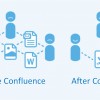I started creating requirements in Google Sheets and quickly realized that this was a dead end. I was looking for a tool that can do the requirements traceability and version control. I was looking for tools for requirements management and knowledge base.
Screening criteria: traceability, cloud, trial period, CSV backup, markdown text support. I tested everything I found.
My article is long, so I want to immediately say the conclusion. Fibery.io и Youtrack.cloud is great not only for task management but also for knowledge base.
Of course, I found corporate tools but did not test them because of the high price and lack of a trial version. Here is their list: inflectra.com, jamasoftware.com, modernrequirements.com.
So, let’s begin.
Reqview.com
Reqview.com \ positive:
-
The platform has requirements traceability
-
A good tool forthose using IEEE/ISO/IEC 29148–2018
-
Import files: CSV, doc
-
Export files: doc, pdf, excel, HTML, csv
-
You can create new fields with different data types
-
Can Automatically collect all requirements into one document
-
You can create document templates
-
Minimalistic editor and interface
-
Easy to use
-
Ready-made templates for your projects
-
Good to use with openproject.org
Reqview.com \ negative:
-
Has traceability but it does not work in the cloud
-
Has only functions for working with requirements (no links to tasks)
-
Not designed for project and task management
Prices: 360€ / year per user
Xebrio.com
Xebrio.com \ positive:
-
The platform has requirements traceability
-
I liked the concept and structure of requirements and tasks management
-
Can Automatically collect all requirements into one document
-
All basic functions are well organized
-
There is the customization of reports and dashboards
-
There is a Time Tracker and team productivity report
-
$1/month per user (up to 10 users)
Xebrio.com \ negative:
-
Integration only with Jira
-
Found bugs. For example, you cannot insert a link to a task or unwanted notifications
-
Unwanted notifications
-
No export to markdown
Prices: for teams of up to 50 people, 10–20$ / month per user
Confluence
Confluence \ positive:
-
The platform has requirements traceability
-
Extensive customization options
-
A familiar and proven tool.
-
Has many plugins
-
Easy integration for Jira users
-
Free for teams with up to 10 users
Confluence \ negative:
-
Clumsy editor and a lot of unnecessary details
-
Heavy interface
-
Complicated access settings
-
There are problems with registration. I signed up on the fifth try
-
Sometimes the cloud is slow. I click “edit” and wait 20–30 seconds.
Prices: 5–11$ / month per user
Asana.com
Asana.com \ positive:
-
Everything you need for project management
-
Good mobile app
-
Clear concept and structure
-
Convenient and modern interface
-
Manage the knowledge base and requirements better in tandem with Notion.so or Slite.com
Asana.com \ negative:
-
The platform does not have a knowledge management tool, so you will have to use tasks as documents.
-
No formulas, no scripts
-
No backup, only a list of tasks from individual projects
-
No deep integration with Github.com
-
You can’t buy 8 users, only 5 or 10
-
If you paid for 30 users for a year, then you can’t fix it and drop it to 10 users.
Prices: 11–25$ / month per user
Monday.com
Monday.com \ positive:
-
You can link your location and view tasks on the map
-
You can customize the dashboard individually for each user
-
Free for teams with up to 2 users
Monday.com \ negative:
-
The platform is not built for knowledge management and traceability
-
You can’t make links between requirements and tasks
-
No document structure
-
The interface has a lot of unnecessary elements
-
You can’t buy 8 users, only 5 or 10
Prices: 10–16€ / month per user
Notion.so
Notion.so \ positive:
-
One of the best knowledge base tools
-
Document editor work in markdown format
-
Good solution if used together with Asana.com
-
Free for 1 user and 5 guests
Notion.so \ Negative:
-
Not designed for managing complex projects
-
You will find it difficult to create traceability between requirements, user stories, and tasks.
Prices: 8$ / month per user
And finally, I will tell you about the two most interesting tools.
Fibery.io
Fibery.io \ positive:
-
Knowledge base and document editor work in markdown format
-
The platform supports calculated fields, scripts, and formulas.
-
The platform has traceability requirements
-
The best backup I’ve ever seen! Export all workspace data into Markdown and CSV files.
-
All comments and attached files are saved in a backup
-
Besides the user, you can create a guest with limited rights for free
-
You can create any process from the same elements
-
Import data from CSV files
-
I was impressed with the workflow automation capabilities
-
After a feature is released, you can notify those customers who have requested it
-
You can share your knowledge base
-
Many training videos with real cases
-
Convenient and modern interface
-
You can make an open corporate blog through the knowledge base tool
-
I liked the values of the team: open roadmap board, transparency, training
-
Free for one user
-
“When you deactivate or remove a user, the unspent amount will be deducted from your next bill”.
-
Free for a year for startups with ARR < than fibery.io
-
Free for a year for open source projects
-
Free for a year for Ukrainian companies
-
50% discount for non-profit and educational organizations
Fibery.io \ negative
-
This good tool can’t be found by google search “requirements management” or “knowledge base building”
-
No mobile app
-
No way to embed google doc via “embed link”
-
No external forms for voting or customer survey
-
No integration with google sheets
-
No integration with Asana.com
-
It is not possible to collect one main document from blocks of other documents and save it into one PDF file
-
There are great features, but I found it difficult to understand the overall structure after using Asana.com
-
Published documents cannot be translated by google translator
Prices: 12$ / month per user
Youtrack.cloud
Youtrack.cloud \ positive:
-
All in one tool: bug tracker, knowledge base, project management
-
The platform has requirements traceability
-
You can import your data from Confluence, Jira, etc.
-
You can share the document and open comments for everyone on the Internet
-
Very fast interface and nothing more
-
Each document has its ID
-
You can easily configure access for tasks and documents
-
I was impressed with the workflow automation capabilities.
-
You can create your workflow scripts using Java
-
Knowledge base and document editor work in markdown format
-
I was amazed by the ability to set resource limits during project planning
-
Good document editing history
-
Easily backup the entire knowledge base
-
Import data from google sheets
-
I like the idea of widgets
-
I like transparency, such as open real-time bug databases
-
It is possible to embed a Google Doc and edit it (Embed Link)
-
You can easily export all project tasks to an excel file
-
You can make an open corporate blog through the knowledge base tool
-
Free for teams with up to 10 users
Youtrack.cloud \ negative:
-
No document status. there is no way to close editing the document and commit the version
-
There is no way to make a full backup in the formats: markdown, json, CSV
-
For projects, you can create any ID prefix, but this cannot be done in documents.
-
You can import CSV files only through google spreadsheets
-
You cannot create a project template.
Prices: 5$ / month per user
Maybe I’ll do a comparison between Fibery and Youtrack. I need to study them better and get feedback from you.
Contact me: peter.hanzo.pro@gmail.com
Author: Peter Rudenko



